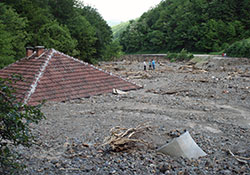WHO/Europe responds to Balkan floods

WHO/Mirza Muminovic
Since 13 May 2014, communities in Bosnia and Herzegovina, Croatia and Serbia have been severely affected by floods.
Due to the scale, urgency, complexity and context of the flooding, WHO has categorized the event as a Grade 2 emergency according to the Emergency Response Framework.
A lack of safe drinking water and the displacement of communities increasing the risk of communicable disease outbreaks, and greater numbers of mosquitoes due to standing water and rising temperatures, are particular health concerns.
In response, WHO/Europe’s support to the countries and communities affected includes:
- the provision of emergency health kits with medicines and supplies to cover the health needs of 90 000 people for 1 month, as well as water purification equipment and water tanks, shipped from United Nations response depots with financial support from Italy, Norway and the Russian Federation;
- public health advice for the general public on the health effects of the floods and appropriate preventive measures, developed jointly by the ministries of health in Bosnia and Herzegovina, Croatia and Serbia and WHO, and provided to affected communities through leaflets distributed in local languages;
- continuing in-depth health needs assessments, despite limited access to some of the affected areas due to damaged bridges and roads; and
- support for post-disaster needs assessments, to be conducted in Bosnia and Herzegovina and Serbia, with expertise mobilized from WHO/Europe and WHO headquarters to address the health sector needs.



